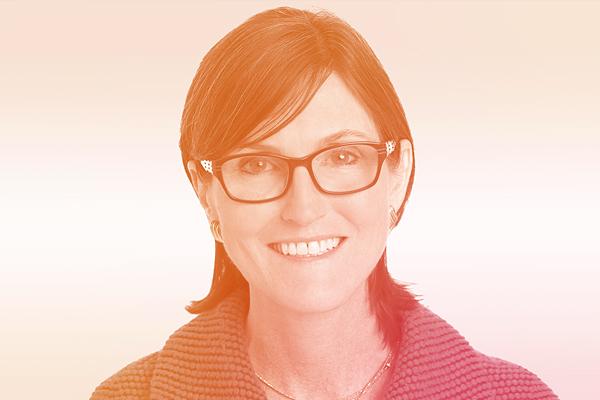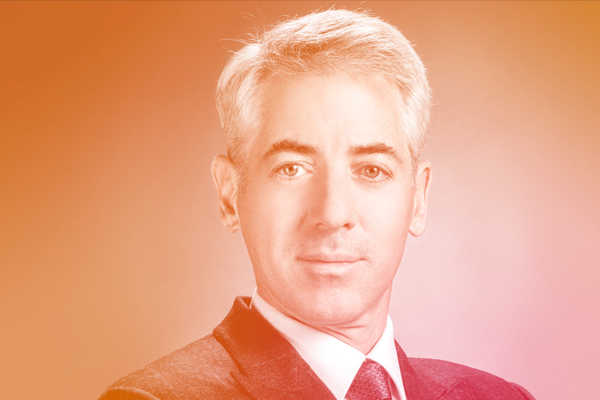
Leading US fund manager Bill Ackman has predicted that 2021 will be a “very good” year for the US sharemarket, with a combination of low interest rates, fiscal stimulus and a new president who will not introduce radical policies.
“Go long”, the founder of Pershing Square Capital told the first virtual Sohn Hearts & Minds Investment Leaders Conference in Australia, in an interview from the US on Friday.
“You’ve got low rates, you’ve got stimulus, you could see infrastructure spending, you’ve still got very well capitalised banks, you’ve got access to capital,” he said.
“I think 2021 could be a very, very good year in the markets, so ‘go long’ I would say.”
Mr Ackman said the US was “setting up for a good recovery, with a more moderate Democrat in the White House.”
He said incoming president Joe Biden would probably not be able to reverse President Donald Trump’s corporate tax cuts, given that the Democrats would not have control of the Senate, and that he did not expect to see an increase in personal tax rates in the near future.
He said there was also as much as $US3bn ($4.15bn) in savings in the US, accumulated by people who had not gone on a holiday or out to dinner, which could be unleashed in new spending if the pandemic were to pass next year.
But he warned the US was still facing a “grim” winter, with the virus still “out of control.”
“It will be a sad few months where we will see out of control case numbers and deaths,” he said.
A major theme of the conference, which sees top fund managers give their stock tips to raise funds for medical research charities, was stocks whose growth had been accelerated by COVID-19 — with healthcare, telemedicine and virtual heath care emerging as key growth sectors.
Two analysts tipped telemedicine stocks, while NYU Stern School of Business marketing professor Scott Galloway predicted online giant Amazon would move into the healthcare sector given its rapid growth in the US.
New York based fund manager Catherine Wood, the founder and chief executive of ARK Investment Management, recommended leading US telemedicine company Teladoc, while David Halpert of Prince Street Capital Management recommended Hong Kong listed, China based Ping An Healthcare and Technology.
“The US has the highest level of spending on health care as a percentage of GDP in the world: almost 20 per cent of GDP,” Ms Wood told the conference.
“We are facing a shortage of physicians and an increasing demand for doctors. We believe that technology will be the solution, she said.
“Virtual healthcare will be a big part of the solution.”
Based in New York state, Teladoc provides online healthcare to more than 60 million people in more than 175 countries including Australia, with a turnover of more than $US550m ($760m).
Ms Wood, who oversees an investment portfolio of almost $US30bn, predicts its customer base will rise to some 220 million over the next five years, with revenue lifting to $US7.8bn annually by 2025 as a result of the rise in the telehealth market and the expansion of its services from healthcare providers to patient care.
She said the global shutdown triggered by the pandemic had forced patients and healthcare providers in the US “with no choice but to go virtual.”
“In the world of innovation, when times are really tough, innovation gains traction as an accelerated rate.
“I have not seen anything happen more quickly than this transition.”
Prince Street’s Mr Halpert said Ping An was well placed to take advantage of the growth in online healthcare in China, where the health system lagged well behind the development of other sectors such as transport.
He said telemedicine and diagnostics using artificial intelligence would play an important role in lowering healthcare costs for providers all over the world.
He favoured Ping An over Teladoc because of the much larger Chinese market potential.
“Ping An Healthcare and Technology has the largest medical data set in the world and therefore one of the most valuable data sets in the world,” Mr Halpert said.
“Coronavirus is a key inflection point for digital health globally. This is a stock that can grow five to 10 times over the next five years.”
He said Teladoc currently had twice the market capitalisation of Ping An but this was because Teladoc was profitable while Ping An Health was deferring profitability so it could invest in its growth.
Ping An has 350 million registered users, the largest of any of its competitors.
“They have this incredible database because they’re affiliated with the Ping An Insurance organisation, which is China’s largest private insurance company,” Mr Halpert said.
“Digitising Chinese health care is an enormous opportunity.”
NYU’s Professor Galloway, the author of The Four (about tech giants Amazon, Apple, Facebook and Google), predicted Amazon would become the fastest growing healthcare company in the world.
He said Amazon already had access to many people’s personal healthcare data and information about people’s homes, and it was logical that it would move into the growing healthcare market given its size.
“Telemedicine is how consumers want to interact with the health care industry.”
Professor Galloway said one of the biggest trends evident during the pandemic was the shift from doctors and hospital to remote medicine.
He said 99 per cent of people in the US who contracted coronavirus did not enter a doctor’s office or a hospital.
Both healthcare professionals and patients wanted to shift more to online and virtual consultations, with doctors having far better technology and infrastructure to deliver advice and prescriptions online.
“This is going to be the most exciting place in business,” he said.
“If I were coming straight out of business school and thinking ‘where to invest?’ I would be thinking long and hard about health tech.”
Professor Galloway said he was an investor in a company called 98point6, which delivered primary heathcare over the phone.
Meanwhile, Paradice Investment Management portfolio manager David Moberley tipped Australian blood products company CSL, arguing it was underrated on concerns about a drop-off in blood donations because of the pandemic.
CSL uses blood to create drug treatments for complex diseases.
Mr Moberley said blood donations were picking up in recent months, while the company was involved in a “game changing” trial of a new product designed to prevent secondary heart attacks.
Elsewhere, the rise in e-commerce was behind the recommendation of ASX-listed online homeware company Temple & Webster, by Sydney based Regal Funds Management small cap portfolio manager Todd Guyot.
Mr Guyot said Temple & Webster had grown rapidly this year as the pandemic saw a big shift to online retail and consumers spent more money on homewares, while they were working from home and not travelling.
He said the online market for homewares was only 6 per cent of the total in Australia, well behind the trends in other markets such as the US and the UK.
Mr Guyot predicted the online homeware market would increase in Australia, following in the trends of big increases in online sales of real estate and cars.
Technology was another theme of the day, with stocks tipped including US workplace communications company Slack, by Hamish Corlett of TDM Growth Partners, while Beeneet Kothari of New York based Tekne Capital Management tipped Hong Kong listed Chinese payments technology platform Yeahka.
Tribeca Investment Partners’ Jun Bei Liu argued that ASX-listed Treasury Wine Estates was good buying value, as its share price had fallen on fears of tariffs being imposed by the Chinese government.
But she argued that the stock had been oversold and that TWE could withstand higher tariffs in China, where consumers loved its wine products including Penfolds.
This article was originally posted on The Australian here.
Licensed by Copyright Agency. You must not copy this work without permission.


In yet another fantastic episode with Equity Mates, first-time conference manager Qiao Ma chats with the guys about her incredible first investment, the investment philosophy of core manager Cooper Investors and the investment thesis behind her conference pitch, Shenzhou International.


NYU Stern School of Business Professor, serial entrepreneur and business podcaster Scott Galloway has blasted “sociopathic” big tech and the US government, while outlining the profound implications of COVID-19 for the US economy and its big players.


Australian investors will be very familiar with potential gains that can be created from innovations in the payment system, think Afterpay. In China, the mobile payments market is both enormous and advanced in technical terms, that’s where Yeahka Ltd operates — a top stock choice from Beeneet Kothari of New York-based Tekne Capital Management at the SOHN Hearts & Minds Investment Conference 2020.


Leading US fund manager Bill Ackman has predicted that 2021 will be a “very good” year for the US sharemarket, with a combination of low interest rates, fiscal stimulus and a new president who will not introduce radical policies.


The rise of telehealth and online medicine as a result of the COVID-19 pandemic has been behind the recommendation of New York based fund manager Cathie Wood, for US based telemedicine and virtual health care company Teladoc Health as her stock pick for the 2020 Australian Sohn Hearts & Minds Investment Conference.


When Bill Ackman realised coronavirus was about to run rife in the West he knew he had to do something fast to protect the $US10bn ($14bn) of assets managed by Pershing Square, much of it in restaurant brands that were vulnerable to the economic lockdowns he saw coming. Rather than sell stock, he opted to hedge via credit default swaps.


Halpert's “digital decolonisation” thesis is that entrepreneurs, companies, governments and consumers in developing markets are reclaiming their digital economies and ecosystems from multinationals, and developing indigenous solutions for local problems.


Billionaire investor Bill Ackman bemoaned his losing bet on Warren Buffett’s Berkshire Hathaway during a virtual appearance at the Sohn Hearts & Minds investment conference this week, according to the Australian Financial Review.


Bill Ackman predicts 2021 will be a rewarding year for the equity market and urged investors to "go long", but the Wall Street legend and Pershing Square founder worries that irrespective of Pfizer's vaccine breakthrough, the US faces a grim winter of coronavirus casualties.


Global stocks exposed to the technology boom, whose performance was partially fuelled by the coronavirus crisis, were the big winners from the calls made by top investment minds at the Sohn Hearts & Minds Investment Conference last year.


Online retail stocks have become the small cap investment story of 2020, according to Todd Guyot, a portfolio manager with Regal’s $320m Australian Small Companies Fund. “We have done well out of the whole online theme of late,” says Guyot, who will be tipping a stock at the fifth annual Sohn Hearts & Minds conference on Friday.


When Bill Ackman realised coronavirus was about to run rife in the West he knew he had to do something fast to protect the $US10bn ($14bn) of assets managed by Pershing Square, much of it in restaurant brands that were vulnerable to the economic lockdowns he saw coming. Rather than sell stock, he opted to hedge via credit default swaps.


Tekne Capital Management portfolio manager Beeneet Kothari says US technology stocks continue to look attractive given their strong earnings outlook and dominant positioning in what he sees as a multi-decade reshaping of economies and business fuelled by COVID-19.


The shock suspension of the Ant Group initial public offering, slated to be the biggest float in history, has left investors reeling, but it could be back up and running within weeks, according to Tribeca Investment Partners’ Jun Bei Liu.


US tech giants are on track: not just to soar through the pandemic, but to structurally lock in their competitive edge well beyond COVID-19. What is more, there will be a tsunami of reallocated capital across the economy, creating huge winners and losers that investors should get ahead of if they don’t want to miss out.


One of the fiercest critics of 'Big Tech', author and academic Scott Galloway, has admitted his bearish call on Afterpay was wrong and warned that America's internet giants are poised to consolidate power following the coronavirus pandemic.


Scott Galloway, outspoken academic and expert on big tech, says "Jedi mind tricks" and "consensual hallucination" are responsible for some huge market valuations, and warns Silicon Valley giants will entrench their dominance in the post-pandemic world.


It has gone down in Wall Street folklore as one of the greatest trades in history – a $US27 million ($37.8 million) bet during the market meltdown in March that returned $US2.6 billion in the space of three weeks. And the mastermind behind it, New York hedge fund titan Bill Ackman, is now bracing for another bout of turbulence.


Wall Street legend Bill Ackman says megacap stocks such as Starbucks will come out of COVID-19 with a bigger moat and a market dominance like never before, and no election outcome will make a difference to the plight of wrecked small businesses.


A little under a year ago, Cathie Wood named Tesla as her top stock pick for 2020. Speaking at the Sohn Hearts & Minds Investment Leaders Conference in Sydney last November, Ms Wood, who runs US technology-focused investment firm Ark Invest, said her bearish case was that the stock price would double by 2024. It hit that milestone less than three months later.


Rory Lucas may have one of the best jobs in finance. As the chief investment officer of Hearts & Minds Investments (HM1), it's his duty to oversee the $780 million portfolio of the best ideas from some of the world's top investors.


Legendary Wall Street investor Bill Ackman will headline the 2020 Sohn Hearts & Minds investment leaders conference this year in a major coup for the event that has raised more than $20 million dollars for medical research since its inception in 2016.